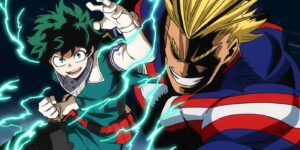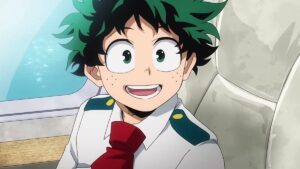My Hero Academia – The Superhero Manga That Inspired a New Generation!
In the vast universe of manga, few titles have managed to capture the hearts and minds of readers quite like My Hero Academia. This superhero manga, created by Kohei Horikoshi, has not only redefined the genre but has also inspired a new generation of fans and creators alike. With its compelling characters, intricate world-building, and themes of heroism and perseverance, My Hero Academia stands as a beacon of hope and inspiration.
The story revolves around Izuku Midoriya, a boy born without superpowers in a world where they are the norm, who dreams of becoming a hero. His journey from an underdog to a symbol of hope resonates deeply with readers, making My Hero Academia a cultural phenomenon.
The manga’s success can be attributed to its relatable characters, each with their unique quirks and struggles, which reflect the diverse experiences of its audience. As the narrative unfolds, it explores themes of friendship, sacrifice, and the true meaning of heroism, encouraging readers to pursue their dreams despite the odds.
My Hero Academia has not only inspired a new generation of manga enthusiasts but has also influenced various forms of media, including anime adaptations, video games, and merchandise. This article delves into the various aspects of My Hero Academia, examining its impact on the manga industry and its role in shaping contemporary superhero narratives.
The Rise of My Hero Academia:
My Hero Academia made its debut in 2014 in Shueisha’s Weekly Shōnen Jump magazine. From the outset, it garnered attention for its unique premise and engaging storytelling. The series quickly gained popularity, leading to an anime adaptation that premiered in 2016.
This adaptation played a crucial role in expanding the manga’s reach, introducing the story to a global audience. The combination of stunning animation, a captivating soundtrack, and voice acting brought the characters to life, further solidifying My Hero Academia as a cultural touchstone. The rise of My Hero Academia can also be attributed to its timing.
The superhero genre was experiencing a renaissance in Western media, with blockbuster films dominating the box office. This created a fertile ground for a manga that explored similar themes but with a distinct Japanese perspective. The series’ focus on personal growth, teamwork, and the moral complexities of heroism resonated with fans, making it a standout title in the crowded manga landscape.
Character Development and Relatability:
One of the most compelling aspects of My Hero Academia is its rich character development. Each character is meticulously crafted, with their own backstories, motivations, and growth arcs. Izuku Midoriya, the protagonist, embodies the struggle of many young people today—facing self-doubt and societal pressure while striving to achieve greatness. His journey from a quirkless boy to a powerful hero serves as a metaphor for perseverance and resilience.

Source: screenrant
Supporting characters like Katsuki Bakugo, Ochaco Uraraka, and Shoto Todoroki each bring their unique perspectives and challenges to the narrative. Bakugo’s explosive personality and rivalry with Midoriya highlight themes of competition and friendship, while Uraraka’s determination to support her family adds depth to her character. Todoroki’s internal conflict regarding his lineage and the expectations placed upon him resonates with readers who grapple with their own identities.
The relatability of these characters is a significant factor in the series’ success. Readers see themselves in the struggles and triumphs of Midoriya and his friends, fostering a deep emotional connection that keeps them invested in the story.
Thematic Depth – Heroism and Morality!
My Hero Academia delves into complex themes surrounding heroism and morality. Unlike traditional superhero narratives that often portray heroes as infallible, the series presents a more nuanced view. Characters grapple with moral dilemmas, questioning what it truly means to be a hero. The series challenges the notion of heroism by exploring the sacrifices heroes must make and the consequences of their actions.
For instance, the character All Might, the Symbol of Peace, embodies the ideal hero but also faces the reality of his limitations. His struggle with maintaining his image while dealing with personal challenges adds depth to his character and prompts readers to consider the burdens that come with heroism. This exploration of moral ambiguity encourages readers to reflect on their values and the complexities of real-life heroism.
World-Building and Quirks:
The world of My Hero Academia is intricately designed, with a society built around the concept of quirks—superpowers that individuals possess. This unique aspect of the narrative allows for a diverse range of abilities, each with its own strengths and weaknesses. The creativity behind these quirks not only adds excitement to battles but also serves as a metaphor for individuality and self-acceptance.
The establishment of U.A. High School, a prestigious institution for aspiring heroes, further enriches the world-building. The school serves as a microcosm of society, showcasing the challenges and dynamics of hero training. The various classes, competitions, and internships provide a realistic portrayal of the journey to becoming a hero, making the story relatable to readers who are navigating their own paths.
Impact on the Manga Industry:
My Hero Academia has had a profound impact on the manga industry, influencing both creators and readers. Its success has paved the way for a new wave of superhero-themed manga, encouraging artists to explore similar narratives. The series has also revitalized interest in shōnen manga, attracting a diverse audience that includes both young readers and adults.
The popularity of My Hero Academia has led to collaborations with various brands, merchandise, and even theme park attractions. This cross-media presence has solidified its status as a cultural phenomenon, demonstrating the power of manga to transcend traditional boundaries.
Anime Adaptation and Global Reach:
The anime adaptation of My Hero Academia has played a pivotal role in its global success. With stunning animation, a compelling soundtrack, and a talented voice cast, the anime brought the manga’s vibrant world to life. The series has been praised for its faithful adaptation of the source material, capturing the essence of the characters and their journeys.
The anime’s release on streaming platforms has made it accessible to a wider audience, allowing fans from different backgrounds to connect with the story. The global reach of My Hero Academia has fostered a passionate fanbase, leading to conventions, fan art, and discussions that celebrate the series’ themes and characters.
Merchandising and Cultural Impact:
The merchandising surrounding My Hero Academia is a testament to its cultural impact. From action figures to clothing, the series has generated a vast array of products that allow fans to engage with the story in tangible ways. This merchandising phenomenon has not only contributed to the series’ financial success but has also fostered a sense of community among fans.

Source: medium
The cultural impact of My Hero Academia extends beyond merchandise. The series has inspired fan art, cosplay, and even academic discussions about its themes and characters. This engagement reflects the deep connection fans have with the story, showcasing how My Hero Academia has become a significant part of contemporary pop culture.
Lessons and Inspiration from My Hero Academia:
My Hero Academia offers valuable lessons that resonate with readers of all ages. The series emphasizes the importance of hard work, determination, and the belief that anyone can become a hero, regardless of their starting point. Midoriya’s journey serves as a reminder that perseverance in the face of adversity can lead to greatness.
Additionally, the series promotes the idea of teamwork and collaboration. The relationships between characters highlight the significance of supporting one another and working together to achieve common goals. This message is particularly relevant in today’s world, where collaboration and empathy are essential for success.
Future of My Hero Academia:
As My Hero Academia continues to evolve, fans eagerly anticipate what lies ahead for Midoriya and his friends. The manga is still ongoing, with new arcs and character developments that promise to keep readers engaged. The anime adaptation also continues to release new seasons, further expanding the story’s reach.
The future of My Hero Academia holds the potential for even greater exploration of its themes and characters. As the series progresses, it will be exciting to see how it continues to inspire a new generation of fans and creators, solidifying its place in the pantheon of iconic manga.
FAQs:
1. What is the main premise of My Hero Academia?
My Hero Academia follows the story of Izuku Midoriya, a boy born without superpowers in a world where they are the norm. Despite this, he dreams of becoming a hero like his idol, All Might. The series explores his journey as he enrolls in U.A. High School, a prestigious academy for aspiring heroes, and learns to harness his abilities while facing various challenges.
2. Who are the main characters in My Hero Academia?
The main characters include Izuku Midoriya, Katsuki Bakugo, Ochaco Uraraka, Shoto Todoroki, and All Might. Each character has their unique quirks and backgrounds, contributing to the rich narrative and themes of friendship, rivalry, and personal growth.
3. What themes are explored in My Hero Academia?
My Hero Academia explores themes of heroism, morality, friendship, perseverance, and self-acceptance. The series challenges traditional notions of heroism by presenting characters who grapple with their identities and the responsibilities that come with their powers.
4. How has My Hero Academia influenced the manga industry?
My Hero Academia has revitalized interest in shōnen manga and inspired a new wave of superhero-themed stories. Its success has encouraged creators to explore similar narratives, leading to a diverse range of titles that resonate with contemporary audiences.
5. What is the significance of quirks in My Hero Academia?
Quirks are superpowers that individuals possess in the world of My Hero Academia. They serve as a metaphor for individuality and self-acceptance, showcasing the diverse abilities and challenges that characters face. The concept of quirks adds excitement to the narrative and allows for creative storytelling.
6. How has the anime adaptation impacted the popularity of My Hero Academia?
The anime adaptation has significantly expanded the reach of My Hero Academia, introducing the story to a global audience. With high-quality animation and a faithful representation of the manga, the anime has garnered a dedicated fanbase and contributed to the series’ cultural impact.
7. What lessons can readers learn from My Hero Academia?
My Hero Academia teaches valuable lessons about hard work, determination, teamwork, and the belief that anyone can become a hero. The series encourages readers to pursue their dreams, support one another, and embrace their unique qualities, fostering a sense of empowerment and resilience.
Conclusion:
My Hero Academia: The Superhero Manga That Inspired a New Generation has undoubtedly left an indelible mark on the world of manga and anime. Through its compelling storytelling, rich character development, and exploration of profound themes, the series has resonated with audiences worldwide. The journey of Izuku Midoriya, from a quirkless boy to a symbol of hope, serves as a powerful reminder that anyone can achieve greatness with determination and hard work.
The impact of My Hero Academia extends beyond its pages, inspiring a new generation of fans and creators to explore the complexities of heroism and the importance of friendship. The series has revitalized the shōnen genre, paving the way for innovative narratives that challenge traditional norms. As the manga continues to evolve, it promises to deliver even more captivating stories and character arcs that will keep readers engaged.
In a world where the concept of heroism is often idealized, My Hero Academia offers a refreshing perspective that emphasizes the struggles and sacrifices that come with being a hero. The series encourages readers to reflect on their values and the importance of empathy, teamwork, and perseverance. As we look to the future, it is clear that My Hero Academia: The Superhero Manga That Inspired a New Generation will continue to inspire and resonate with audiences for years to come.







